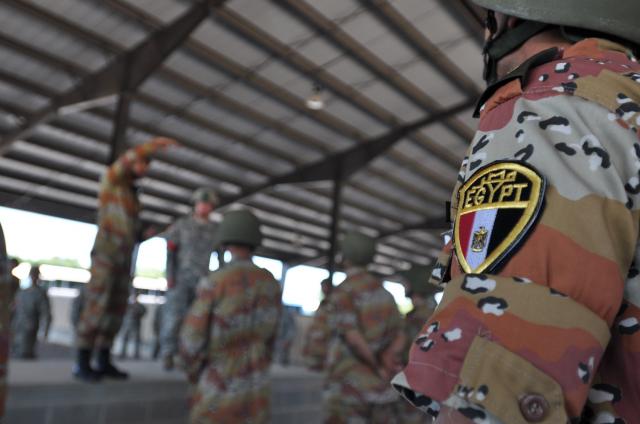Saudi Arabia and Egypt are considering holding large-scale military exercises after launching air strikes on Yemeni rebels who have been slapped with a UN arms embargo and sanctions.
In a possible sign the Saudi-led air campaign against the Shiite rebels might expand into a ground operation, Cairo said it and Riyadh were mulling the drills in Saudi Arabia with other Gulf countries participating.
“It was decided to form a joint military committee to look into a large-scale strategic manoeuvre on Saudi territory,” Egyptian President Abdel Fattah al-Sisi’s office said late Tuesday after he met the Saudi defence minister.
Saudi Arabia and a coalition of Arab countries launched the air strikes on March 26, after the rebels seized the capital Sanaa last year and advanced on the main southern city of Aden, where President Abedrabbo Mansour Hadi had taken refuge.
Hadi fled to Riyadh from Aden, which has since seen heavy fighting between pro- and anti-government forces, with overnight rebel attacks killing at least seven people.
Saudi Arabia has accused Tehran — the main Shiite power — of arming the rebels and the conflict has heightened tensions in the Middle East.
Iranian President Hassan Rouhani insisted that the Islamic Republic is not seeking regional dominance.
His country’s “ultimate goal is not Iran’s domination of the region (or) the dominance of the Shiite on Sunni,” he said.
“For us there is no difference between the Shiites and the Sunnis, Turks, Arabs, Persians or Baluchis,” Rouhani said in a speech in the Caspian Sea city of Rasht.
‘No half measures’
In Riyadh, coalition spokesman Brigadier General Ahmed al-Assiri charged that “Iran has played a role in arming these militia” and must stop.
He added that the coalition has “in a large proportion” succeeded in halting the militia’s advance in the south.
Separately, the kingdom’s ambassador to the United States said the air campaign had been “very successful” and gone “beyond its goals”.
In the past three weeks, the campaign “has been able to degrade and destroy much of the military infrastructure that Huthis and (former president Ali Abdullah) Saleh possess,” Adel al-Jubeir told reporters in Washington.
The Huthis have allied with troops loyal to Saleh, who was forced from power in 2012 following a year of nationwide protests against his three-decade rule.
The ambassador added that “this operation will continue until objectives are achieved. There can be no half measures.”
Speaking in Lisbon, Iranian Foreign Minister Mohammad Javad Zarif said the “carnage” in Yemen should end, to prevent Al-Qaeda from benefiting.
He added that his country was prepared to use its influence to “bring everyone to the negotiating table.”
UN envoy to Yemen resigns
Meanwhile the UN peace envoy to Yemen Jamal Benomar has resigned after losing support from Gulf countries for his mission in the conflict-riven nation, a UN official said Wednesday.
His departure came after the UN Security Council adopted a resolution calling for the swift resumption of peace talks and an end to violence in Yemen.
The resolution — the first formal action taken by the Security Council since the start of the air raids — demands the Huthis withdraw from Sanaa and all other areas they have seized.
It slaps an arms embargo on Huthi leaders and their allies and puts chief Abdulmalik al-Huthi and Saleh’s eldest son, Ahmed, on a sanctions list, imposing a global travel ban and an assets freeze on them.
With civilian casualties mounting and agencies struggling to bring in aid, there have been warnings of a major humanitarian crisis in the already-impoverished country.
Residents say they are suffering from major food and water shortages, with many afraid to leave their homes for fear of being caught in the crossfire.
The World Health Organization says at least 736 people have died in the conflict since April 12 and more than 2,700 have been wounded.
The United Nations said nearly half the casualties were civilians, and UN human rights chief Zeid Ra’ad Al Hussein called Tuesday for an investigation.










